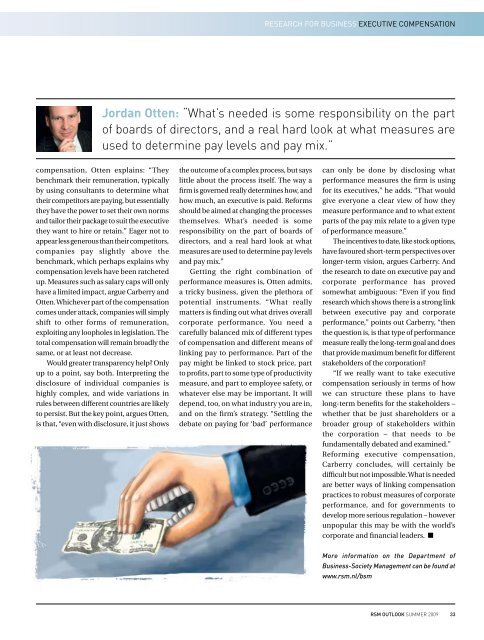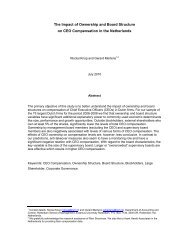here - Rotterdam School of Management
here - Rotterdam School of Management
here - Rotterdam School of Management
You also want an ePaper? Increase the reach of your titles
YUMPU automatically turns print PDFs into web optimized ePapers that Google loves.
compensation, Otten explains: “They<br />
benchmark their remuneration, typically<br />
by using consultants to determine what<br />
their competitors are paying, but essentially<br />
they have the power to set their own norms<br />
and tailor their package to suit the executive<br />
they want to hire or retain.” Eager not to<br />
appear less generous than their competitors,<br />
companies pay slightly above the<br />
benchmark, which perhaps explains why<br />
compensation levels have been ratcheted<br />
up. Measures such as salary caps will only<br />
have a limited impact, argue Carberry and<br />
Otten. Whichever part <strong>of</strong> the compensation<br />
comes under attack, companies will simply<br />
shift to other forms <strong>of</strong> remuneration,<br />
exploiting any loopholes in legislation. The<br />
total compensation will remain broadly the<br />
same, or at least not decrease.<br />
Would greater transparency help? Only<br />
up to a point, say both. Interpreting the<br />
disclosure <strong>of</strong> individual companies is<br />
highly complex, and wide variations in<br />
rules between different countries are likely<br />
to persist. But the key point, argues Otten,<br />
is that, “even with disclosure, it just shows<br />
the outcome <strong>of</strong> a complex process, but says<br />
little about the process itself. The way a<br />
firm is governed really determines how, and<br />
how much, an executive is paid. Reforms<br />
should be aimed at changing the processes<br />
themselves. What’s needed is some<br />
responsibility on the part <strong>of</strong> boards <strong>of</strong><br />
directors, and a real hard look at what<br />
measures are used to determine pay levels<br />
and pay mix.”<br />
Getting the right combination <strong>of</strong><br />
performance measures is, Otten admits,<br />
a tricky business, given the plethora <strong>of</strong><br />
potential instruments. “What really<br />
matters is finding out what drives overall<br />
corporate performance. You need a<br />
carefully balanced mix <strong>of</strong> different types<br />
<strong>of</strong> compensation and different means <strong>of</strong><br />
linking pay to performance. Part <strong>of</strong> the<br />
pay might be linked to stock price, part<br />
to pr<strong>of</strong>its, part to some type <strong>of</strong> productivity<br />
measure, and part to employee safety, or<br />
whatever else may be important. It will<br />
depend, too, on what industry you are in,<br />
and on the firm’s strategy. “Settling the<br />
debate on paying for ‘bad’ performance<br />
RESEARCH FOR BUSINESS EXECUTIVE COMPENSATION<br />
Jordan Otten: “What’s needed is some responsibility on the part<br />
<strong>of</strong> boards <strong>of</strong> directors, and a real hard look at what measures are<br />
used to determine pay levels and pay mix.”<br />
can only be done by disclosing what<br />
performance measures the firm is using<br />
for its executives,” he adds. “That would<br />
give everyone a clear view <strong>of</strong> how they<br />
measure performance and to what extent<br />
parts <strong>of</strong> the pay mix relate to a given type<br />
<strong>of</strong> performance measure.”<br />
The incentives to date, like stock options,<br />
have favoured short-term perspectives over<br />
longer-term vision, argues Carberry. And<br />
the research to date on executive pay and<br />
corporate performance has proved<br />
somewhat ambiguous: “Even if you find<br />
research which shows t<strong>here</strong> is a strong link<br />
between executive pay and corporate<br />
performance,” points out Carberry, “then<br />
the question is, is that type <strong>of</strong> performance<br />
measure really the long-term goal and does<br />
that provide maximum benefit for different<br />
stakeholders <strong>of</strong> the corporation?<br />
“If we really want to take executive<br />
compensation seriously in terms <strong>of</strong> how<br />
we can structure these plans to have<br />
long-term benefits for the stakeholders –<br />
whether that be just shareholders or a<br />
broader group <strong>of</strong> stakeholders within<br />
the corporation – that needs to be<br />
fundamentally debated and examined.”<br />
Reforming executive compensation,<br />
Carberry concludes, will certainly be<br />
difficult but not impossible. What is needed<br />
are better ways <strong>of</strong> linking compensation<br />
practices to robust measures <strong>of</strong> corporate<br />
performance, and for governments to<br />
develop more serious regulation – however<br />
unpopular this may be with the world’s<br />
corporate and financial leaders.<br />
More information on the Department <strong>of</strong><br />
Business-Society <strong>Management</strong> can be found at<br />
www.rsm.nl/bsm<br />
RSM OUTLOOK SUMMER 2009 33
















